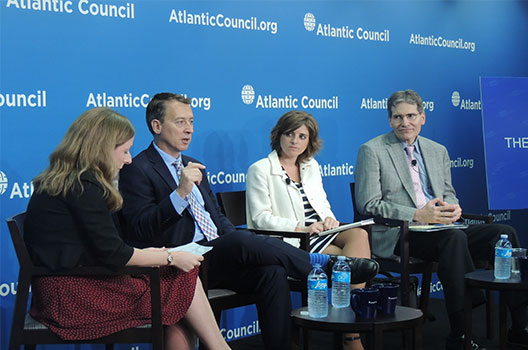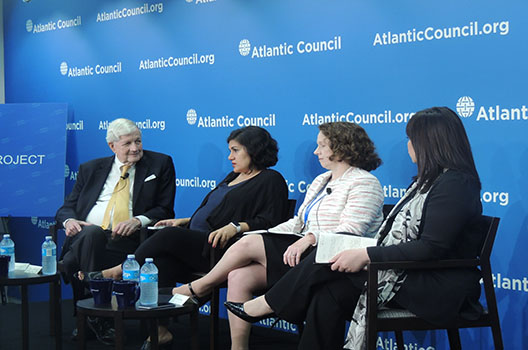 The nuclear deal with Iran has laid the foundation for a stable relationship between the United States and Iran, and the next US administration must prioritize ties with the Islamic Republic, panelists agreed at a conference at the Atlantic Council in Washington on June 16.
The nuclear deal with Iran has laid the foundation for a stable relationship between the United States and Iran, and the next US administration must prioritize ties with the Islamic Republic, panelists agreed at a conference at the Atlantic Council in Washington on June 16.
The next US president must see Iran as a “great priority,” said Suzanne DiMaggio, director of the US-Iran Initiative at New America.
“We have to figure out how to take the air out of some of the more contentious points that we have had with Iran,” she added.
DiMaggio spoke alongside other foreign policy experts and US government officials at a conference jointly hosted by the Atlantic Council and the Iran Project.
Donald Trump, the presumptive Republican presidential nominee, has come out against the nuclear deal and furthering relations with Iran, while his the Democratic opponent, Hillary Rodham Clinton, has welcomed the accord with caution.
Ben Rhodes, deputy national security advisor for strategic communications, warned in his keynote address at the conference that ripping up the deal would lead to a crisis in the Middle East and alienate allies of the United States who jointly worked to broker the agreement.
Iran and the P5+1—the United States, the United Kingdom, Russia, China, France, and Germany—reached a deal on July 14, 2015, that limits Iran’s ability to build a nuclear bomb in exchange for sanctions relief. The accord, known as the Joint Comprehensive Plan of Action (JCPOA), ensures that Iran’s nuclear energy program will remain “exclusively peaceful.” The agreement was fully implemented on January 16 this year.
The United States has arguably built a more sustainable and secure relationship with Iran as a consequence of the nuclear deal, according to panelists.
“If anything, the Islamic Republic is more secure and more consolidated than it has been at any time since the revolution. And I think that is fundamentally [borne] out of [the Obama] administration and its diplomatic outreach and strategy toward Iran,” said Suzanne Maloney, deputy director of the foreign policy program at the Brookings Institution.
The implementation of the accord is widely seen as a positive development between the United States and Iran, and a key strategic victory for the United States in its foreign policy with the Middle East writ large. Israel and the United States’ Arab Gulf partners, however, have reservations about the deal.
In August of 2013, Hassan Rouhani was elected president of Iran on a largely moderate platform. His administration’s domestic policies have been credited in part with paving the way for the nuclear negotiations.
“The 2013 election could be seen as a public referendum on the future of Iran’s nuclear program and its foreign policy. The electorate came out strongly in support of Rouhani, who was running on a platform of moderation and prudence and he has been pretty successful in shifting the path of the previous administration, which was particularly adventurous and reckless,” said Negar Mortazavi, an Iranian-American journalist.

From Left: William Luers, director of the Iran Project moderates a panel with Negar Mortazavi, an Iranian-American journalist and analyst; Suzanne Maloney, deputy director of the Foreign Policy program at the Brookings Institution and a senior fellow in the Brookings Center for Middle East Policy and Energy Security and Climate Initiative; and Suzanne DiMaggio, director of the US-Iran Initiative at New America. (Gayatri Chandrasekaran/Atlantic Council)
Iran will hold parliamentary elections in September and the next presidential elections are scheduled for early 2017.
“It was unimaginable to any Iranians—moderates and hardliners—in 2013 even, that the Iranian foreign minister would meet with the US secretary of state in public, on the record, and actually making progress,” said Mortazavi.
“This is not something that has happened any time before and that is a breakthrough,” she added.
Since implementation day, Rouhani has campaigned for international investment in the Islamic Republic amid renewed relations with the United States and European countries, including France.
Regionally, Iran is increasingly seen as a pivotal player in its relations with the greater Middle East—particularly with Saudi Arabia and Israel.
Relations between Saudi Arabia and Iran flared up after Saudi Arabia executed a key Shi’ite cleric Nimr al-Nimr in January. Shortly after, Iranian protestors pillaged the Saudi Embassy in Tehran. Saudi Arabia has since cut off diplomatic ties with Iran.
Saudi Deputy Crown Prince Mohammed Bin Salman, who is also the kingdom’s defense minister, was in Washington this week to meet with US Secretary of State John Kerry. US President Barack Obama met with Bin Salman on June 17 to discuss Saudi Arabia’s role in Syria and Yemen.
From Left: Barbara Slavin, acting director of the Future of Iran Initiative moderated a panel with Bruce Riedel, director of the Intelligence Project at the Brookings Institution and a former senior director for the Near East and South Asia on the National Security Council; J. Matthew McInnis, a resident fellow at the American Enterprise Institute and a former senior analyst in the US Department of Defense and Intelligence Community; and Ellen Laipson, a senior fellow and president emeritus of the Stimson Center and former deputy chair of the National Intelligence Council. (Gayatri Chandrasekaran/Atlantic Council)
“Iran is on a trajectory that it is a force to be reckoned with beyond its own borders,” said Ellen Laipson, former deputy chair of the National Intelligence Council.
Iran carried out ballistic missile tests in March. the United States and its allies condemned the test.
“Previously, there have been periods of Saudi-Iran rapprochement…but right now, I don’t see rapprochement in the near future,” said Bruce Riedel, director of the Intelligence Project at the Brookings Institution and former National Security Council official.
“This is a complex rivalry with deep, deep, roots and it’s not amenable to simple resolution,” he added.
The nuclear deal is seen as a positive and pivotal moment in the US-Iran relationship.
“Is it now time to think about this transactional deal as a potentially transformative moment in the US-Iran relationship? Can we think about the possibility of turning it into something more enduring,” asked DiMaggio.
“We seem to be in the phase where we are one step forward two steps back. Can we get to a phase where we are two steps forward and one step back,” she added.
Mitch Hulse is an editorial assistant at the Atlantic Council. You can follow him on Twitter @mitchhulse.
Image: From Left: Elizabeth Rosenberg, director of the Energy, Economics, and Security Program at the Center for a New American Security; John E. Smith, acting director of the U.S. Department of the Treasury’s Office of Foreign Assets Control (OFAC); Teresa Archer Pratas, deputy head of the sanctions divisions at the European External Action Service; and George Kleinfeld, a sanctions expert at the law firm Clifford Chance (Gayatri Chandrasekaran/Atlantic Council)
